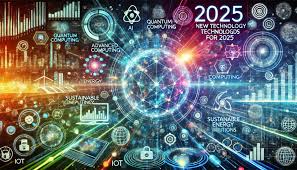The Latest Technologies Shaping Our Future
In today’s fast-paced world, technology continues to advance at an unprecedented rate, transforming the way we live, work, and interact. From artificial intelligence to quantum computing, the latest technologies are setting the stage for a future that was once only imaginable in science fiction. Here’s a look at some of the most exciting developments that are currently making waves.
Artificial Intelligence and Machine Learning
Artificial Intelligence (AI) and Machine Learning (ML) have become integral parts of modern technology. These systems are designed to mimic human intelligence by learning from data patterns and improving their performance over time. AI is being used in various fields such as healthcare, where it aids in diagnostics and personalised medicine; in finance, for fraud detection; and in customer service through chatbots.
5G Connectivity
The rollout of 5G networks is set to revolutionise connectivity by providing faster internet speeds and more reliable connections. This technology will not only enhance mobile phone experiences but also facilitate advancements in areas such as the Internet of Things (IoT), autonomous vehicles, and smart cities. The increased bandwidth and reduced latency will enable seamless communication between devices on a massive scale.
Quantum Computing
Quantum computing represents a significant leap forward from traditional computing methods. By leveraging the principles of quantum mechanics, these computers can perform complex calculations at unprecedented speeds. Although still in its nascent stages, quantum computing has the potential to revolutionise industries like cryptography, materials science, and drug discovery by solving problems that are currently unsolvable with classical computers.
Blockchain Technology
Originally developed as the underlying technology for cryptocurrencies like Bitcoin, blockchain has found applications beyond digital currencies. Its decentralised nature ensures transparency and security in transactions, making it ideal for use cases such as supply chain management, voting systems, and secure data sharing across industries.
Augmented Reality (AR) and Virtual Reality (VR)
AR and VR technologies are blurring the lines between the digital and physical worlds. While VR immerses users in entirely virtual environments for gaming or training purposes, AR overlays digital information onto the real world through devices like smartphones or AR glasses. These technologies are being utilised across sectors including education, healthcare, real estate, and entertainment.
Sustainable Technologies
As concerns about climate change grow stronger, sustainable technologies are gaining traction. Innovations such as renewable energy sources—solar panels with increased efficiency or wind turbines with improved designs—are crucial for reducing our carbon footprint. Additionally, advancements in battery storage solutions are enabling more effective use of renewable energy.
The Road Ahead
The rapid pace of technological advancement shows no signs of slowing down. As these new technologies continue to evolve and mature, they hold tremendous potential to reshape our society positively if harnessed responsibly. Staying informed about these developments will be key to understanding their impact on our lives both now and in the future.
Exploring the Advantages of Cutting-Edge Technologies: Efficiency, Connectivity, and Sustainability
- Enhanced Efficiency
- Improved Communication
- Increased Connectivity
- Innovative Solutions
- Enhanced User Experience
- Sustainable Development
Seven Drawbacks of Emerging Technologies: Privacy, Jobs, and More
- Privacy Concerns
- Job Displacement
- Digital Divide
- Cybersecurity Risks
- Environmental Impact
- Health Concerns
- Dependency Issues
Enhanced Efficiency
Enhanced Efficiency: The latest technologies have revolutionised how we work by streamlining processes and tasks, ultimately saving valuable time and resources. Automation, artificial intelligence, and data analytics are just a few examples of technological advancements that have significantly improved efficiency in various industries. By automating repetitive tasks, providing real-time insights, and optimising workflows, these technologies enable businesses to operate more effectively and productively. As a result, organisations can allocate their resources more efficiently, focus on strategic initiatives, and deliver better outcomes in a shorter timeframe.
Improved Communication
In today’s digital age, one of the significant benefits of the latest technologies is the improvement in communication. Advanced communication tools such as video conferencing, instant messaging platforms, and social media networks have revolutionised the way we connect with others, enabling seamless interaction across vast distances. These innovations have bridged geographical barriers, allowing individuals to communicate in real-time, collaborate on projects remotely, and stay connected with friends and family regardless of their location. The ease and efficiency of modern communication technologies have transformed how we conduct business, maintain relationships, and share information, fostering a more connected and globalised world.
Increased Connectivity
The advent of technologies such as 5G has ushered in a new era of increased connectivity, offering faster and more reliable connections that pave the way for a more interconnected world. With the ability to transmit data at unprecedented speeds, 5G technology not only enhances our mobile experiences but also opens up possibilities for seamless communication between devices on a global scale. This heightened connectivity not only boosts efficiency and productivity but also fosters innovation in various sectors, ultimately bringing people closer together and driving progress in the digital age.
Innovative Solutions
Cutting-edge technologies bring forth innovative solutions that address intricate challenges across diverse industries. By harnessing the power of advancements such as artificial intelligence, blockchain, and quantum computing, organisations can devise creative strategies to streamline processes, enhance efficiency, and drive growth. These innovative solutions pave the way for unprecedented breakthroughs, transforming the landscape of business operations and opening up new possibilities for tackling complex issues with agility and ingenuity.
Enhanced User Experience
The latest technologies, particularly Augmented Reality (AR), Virtual Reality (VR), and Artificial Intelligence (AI), are revolutionising the way users interact with digital content by offering enhanced user experiences. AR and VR create immersive environments that allow users to engage with digital elements in a more interactive and realistic manner, whether it’s through virtual tours, gaming, or training simulations. Meanwhile, AI personalises these experiences by analysing user preferences and behaviours to deliver tailored content and recommendations. This combination of immersive technology not only captivates users but also fosters deeper engagement, making digital interactions more intuitive and enjoyable. As a result, businesses across various sectors are leveraging these technologies to elevate customer satisfaction and drive brand loyalty.
Sustainable Development
Technological advancements in renewable energy play a crucial role in promoting sustainable development and mitigating the effects of climate change. By harnessing sources such as solar, wind, and hydroelectric power, these innovations offer a cleaner alternative to traditional fossil fuels, reducing carbon emissions and environmental impact. Embracing renewable energy technologies not only helps combat global warming but also fosters a greener future for generations to come, ensuring a more sustainable planet for all.
Privacy Concerns
Privacy concerns have become increasingly prevalent with the proliferation of the latest technologies. One significant con is the potential risk to individuals’ privacy resulting from the collection and storage of vast amounts of personal data. From social media platforms tracking user behaviours to smart devices monitoring household activities, the ease of data collection in today’s digital landscape raises questions about who has access to this information and how it is being used. As technology continues to advance, addressing these privacy concerns and implementing robust data protection measures will be crucial to safeguarding individuals’ rights and maintaining trust in the digital age.
Job Displacement
One significant con of the latest technologies is the potential for job displacement. Automation and advancements in Artificial Intelligence (AI) have the capacity to streamline processes and increase efficiency in various industries. However, this progress comes at a cost, as it may result in the automation of tasks that were previously carried out by human workers. This shift towards automation could lead to job losses in certain sectors, ultimately impacting employment rates and potentially creating challenges for individuals who may need to transition to new roles or acquire additional skills to remain competitive in the evolving job market.
Digital Divide
The digital age brings with it a significant con known as the Digital Divide, where not everyone has equal access to the latest technologies. This disparity in access widens the gap between the digital haves and have-nots, creating a divide that can perpetuate existing inequalities. Those without adequate access to technology face barriers in education, employment opportunities, and essential services, further marginalising them in an increasingly digital-centric world. Bridging this gap is crucial to ensure that all individuals have equal opportunities to thrive and participate fully in the benefits that technology can offer.
Cybersecurity Risks
With the rapid advancement of technology, one significant con that accompanies it is the heightened cybersecurity risks. The increased connectivity provided by the latest technologies opens up avenues for cyberattacks and data breaches, posing a serious threat to sensitive information. As more devices and systems become interconnected, the potential vulnerabilities also increase, making it imperative for individuals and organisations to prioritise cybersecurity measures to safeguard their data and privacy from malicious actors seeking to exploit these weaknesses.
Environmental Impact
The rapid evolution of technology comes with a significant downside in terms of its environmental impact. The production and disposal of tech devices generate electronic waste and carbon emissions, posing a serious threat to the environment. As consumers constantly upgrade to newer gadgets, the discarded electronics contribute to the growing issue of e-waste, which often ends up in landfills or incinerators, releasing harmful toxins into the air and soil. Additionally, the manufacturing processes of these devices consume valuable resources and energy, further exacerbating carbon emissions and environmental degradation. It is crucial for both manufacturers and consumers to consider the long-term consequences of technological consumption and strive towards more sustainable practices to mitigate these adverse effects on our planet.
Health Concerns
Prolonged exposure to screens from devices such as smartphones and computers poses a significant health concern in today’s digital age. The blue light emitted by these screens can cause eye strain, leading to symptoms like dry eyes, blurred vision, and headaches. Moreover, excessive screen time before bedtime can disrupt the body’s natural sleep-wake cycle, resulting in sleep disturbances and potential long-term effects on overall health. It is essential for individuals to be mindful of their screen usage and take necessary precautions to mitigate the adverse health impacts associated with prolonged screen exposure.
Dependency Issues
One significant con of the latest technologies is the issue of dependency. As society becomes increasingly reliant on technology for communication, entertainment, and everyday tasks, there is a growing concern about the negative impact on human interactions. Over-reliance on devices can lead to decreased face-to-face communication, fostering social isolation and potentially weakening personal relationships. Moreover, the sedentary nature of many technological activities can contribute to reduced physical activity levels, posing risks to both physical health and mental well-being. It is essential for individuals to strike a balance between utilising technology for its benefits while also prioritising real-world connections and maintaining a healthy lifestyle.



